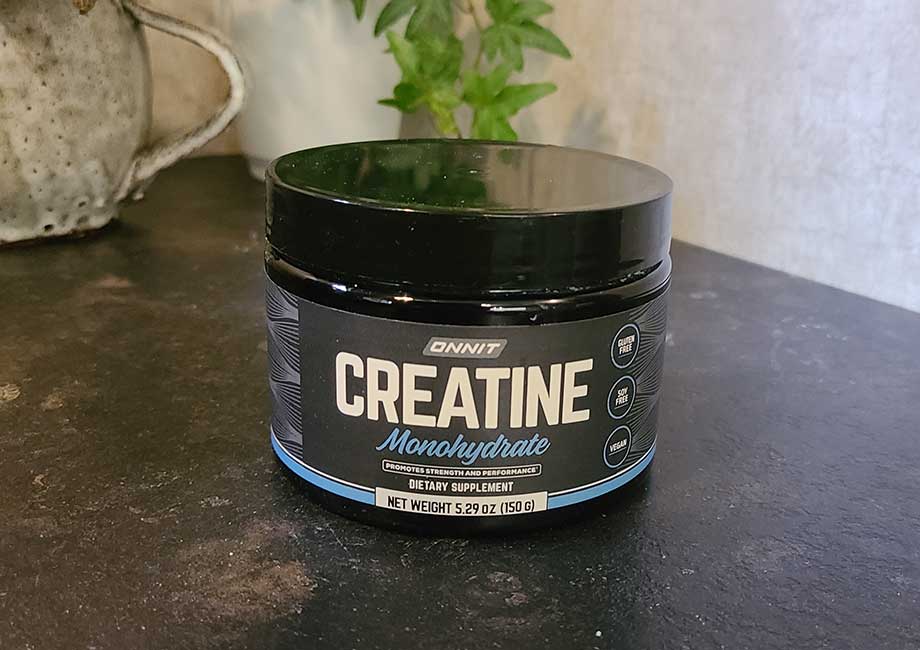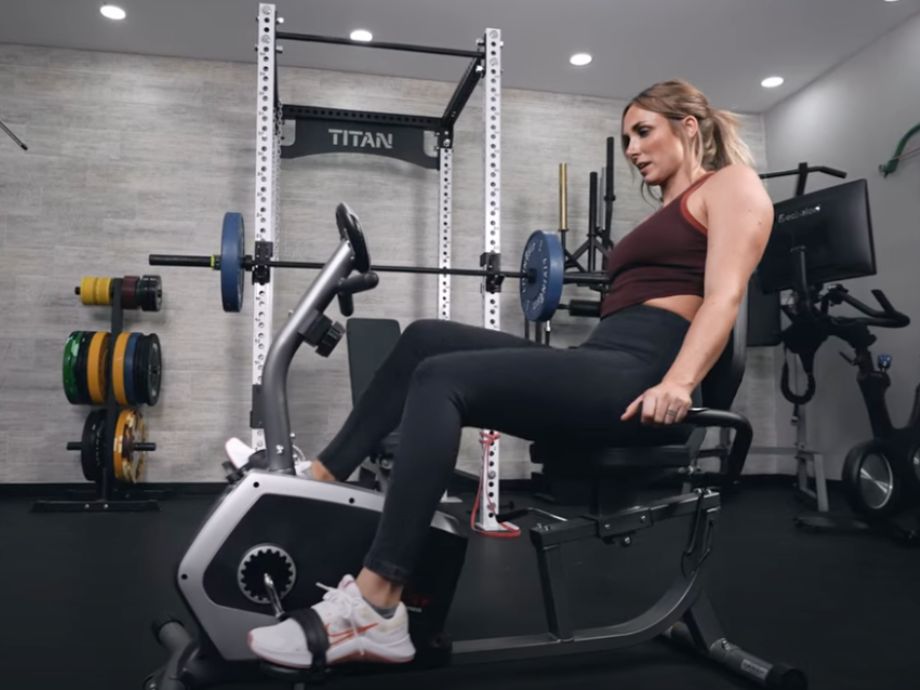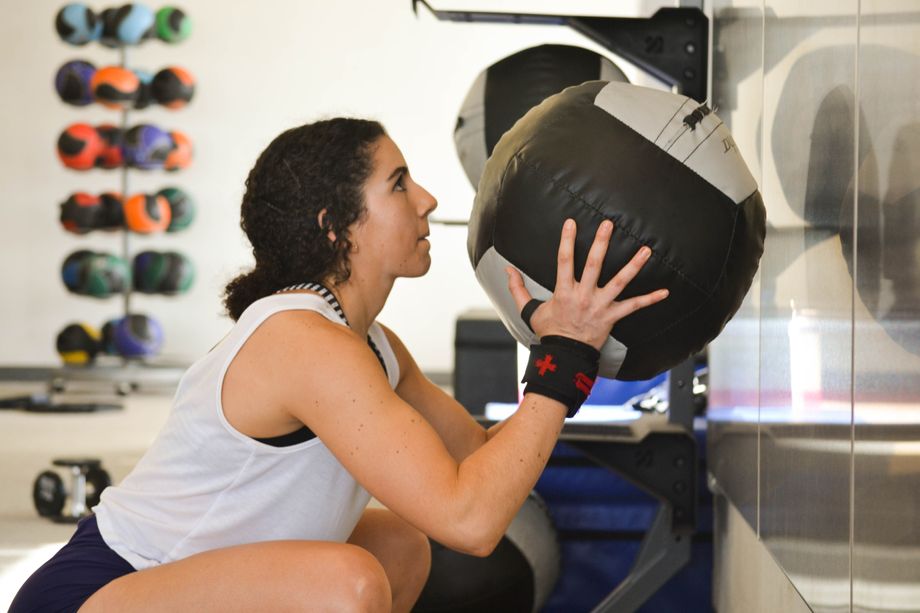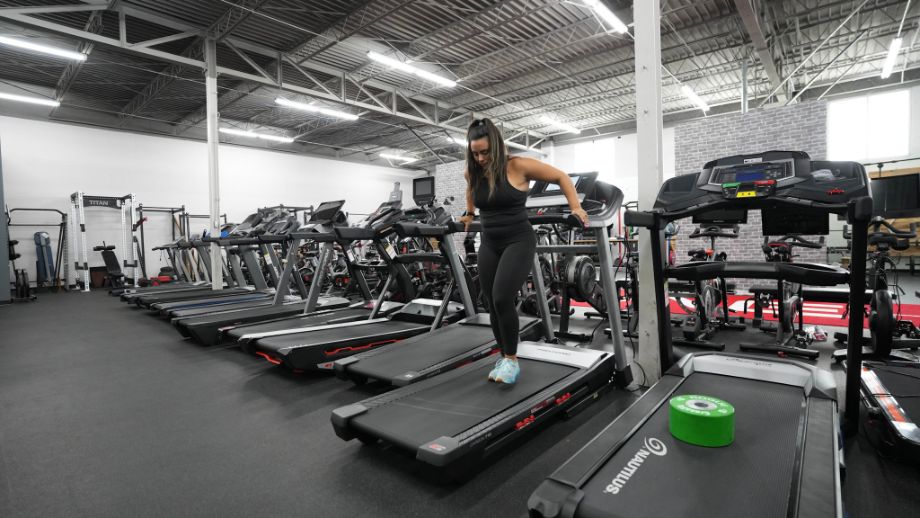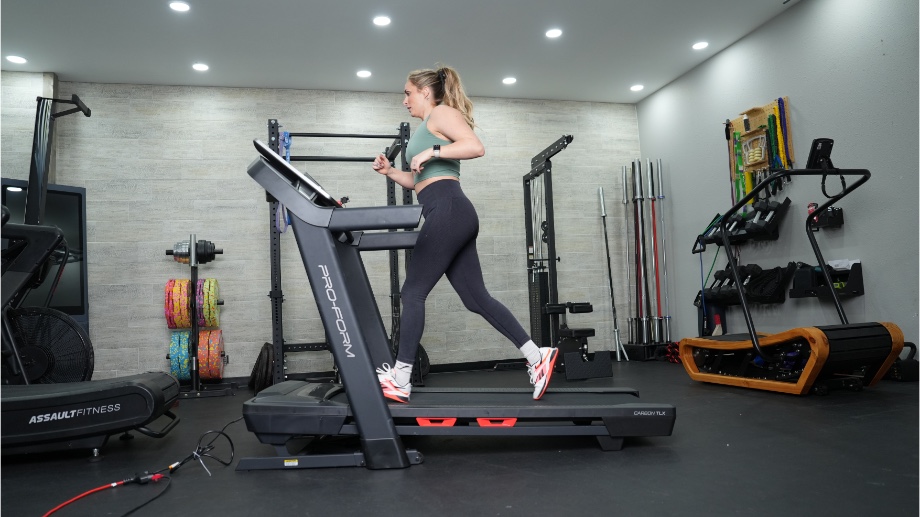Everyone wants a magic pill to help them build muscle, lose body fat, get stronger, and have more energy. What if I told you that such a compound actually exists?
OK, nothing is truly magic, but creatine might be as close as we can get to the coveted magic pill. This dietary supplement is the most popular sports nutrition supplement for a good reason—well, actually, 10 good reasons, as I detail in this guide to creatine benefits.
RELATED: Best Creatine Supplements
Medical disclaimer: This article is intended for educational and informational purposes only. It is not intended as a substitute for medical advice. For health advice, contact a licensed healthcare provider.
What is Creatine?
Creatine is a chemical compound composed of three nonessential amino acids—arginine, glycine, and methionine—that functions as a natural source of energy in your muscles during contraction. Creatine does this through its active form, phosphocreatine, which stores energy in your skeletal muscles and helps generate adenosine triphosphate (ATP). ATP is the “energy currency” that helps power your body during tough training sessions.
Your body can naturally produce its own creatine since its amino acids are nonessential, but you can also up your creatine stores through a diet rich in seafood, red meat, and poultry. You can also take creatine as a supplementary pill or powder. Creatine isn’t as present in plant-based nutrition, so those on a vegetarian or vegan diet may need to employ creatine supplements to increase their overall amounts.
How Creatine Works In the Body
Creatine1 is a compound created endogenously (in the body) from the amino acids arginine, methionine, and glycine. Your body already produces creatine on its own in the liver, pancreas, and kidneys, but creatine supplementation can increase the stores of it in your body.
Creatine plays an important role in energy metabolism in the body—that is, how your body creates energy from food (carbohydrates, fats, and proteins) to move. It’s especially important in the phosphocreatine system, which is an anaerobic energy system, a system that operates without oxygen. (Learn the difference between aerobic vs anaerobic metabolism here.)
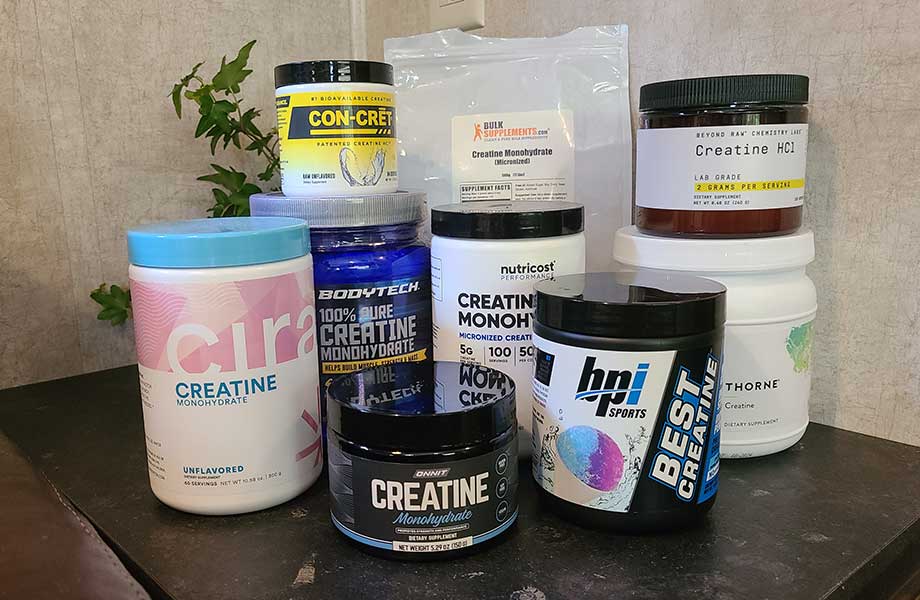
The phosphocreatine system engages during high-intensity activities that last a short amount of time (about 10 seconds of maximal effort). It’s the first of the three energy systems in your body to kick in, and it’s largely what powers your body through a one-rep max deadlift or a 50-yard dash, according to the National Academy of Sports Medicine’s Sports Nutrition Coach Certification course2.
Where creatine comes in is the production of adenosine triphosphate (ATP)3. ATP has been termed the “energy currency” in athletic performance due to its critical role in skeletal muscle contraction4—without ATP, your muscles don’t contract and you don’t move.
RELATED: Creatine vs Pre-Workout—Which Is Better?
Benefits of Creatine Supplementation
According to a 2014 review in the journal Sports Medicine5 by Kent Sahlin, sports physiologist, “Anaerobic capacity (i.e., the amount of ATP that can be produced) is determined by the muscle content of PCr (phosphocreatine), the buffer capacity and the volume of the contracting muscle mass.”
So, when creatine levels in the muscle are higher, the body has a higher capacity to maintain short-term, high-intensity exercise performance.
The National Academy of Sports Medicine2 states that “the body needs to replenish about 1 to 3 grams of creatine per day to maintain normal (unsupplemented) creatine stores, depending on muscle mass.
“When creatine loading strategies are employed,” the course text reads, “particularly with the addition of carbohydrate and protein, muscle creatine stores can be increased above the average individual.2”
The bottom line: supplementing with creatine increases stores of creatine in muscle cells and improves physical performance.
RELATED: How Long Does Creatine Stay In Your System?
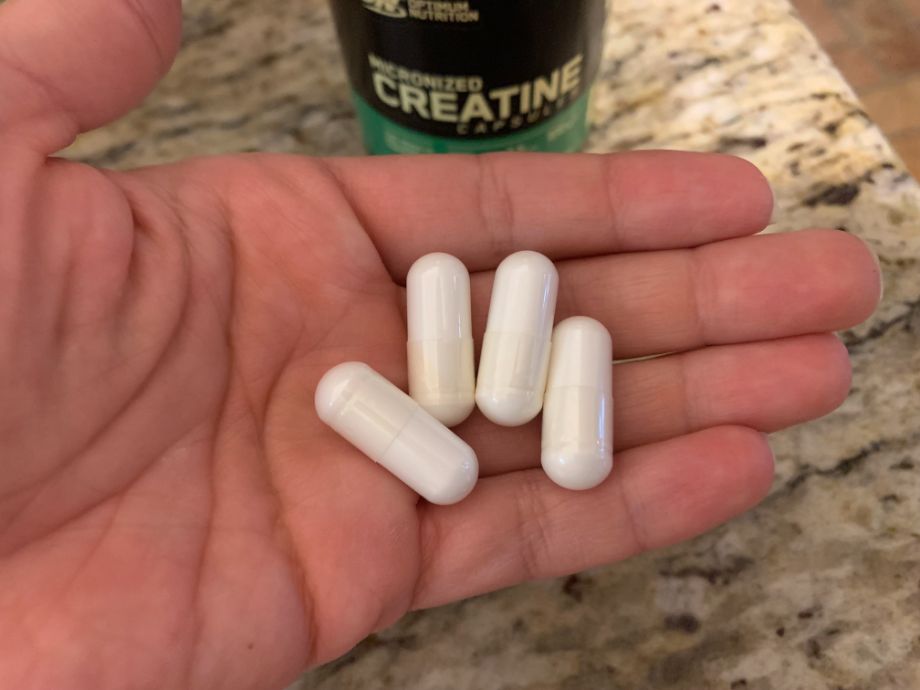
1. Increases Muscle Strength
If you are looking to get the most out of your resistance training sessions, creatine needs to be a part of your supplement stack. Just four weeks of creatine supplementation can produce substantial increases in maximal strength, according to a 2018 randomized controlled trial in the journal Nutrients6. These findings are backed by dozens upon dozens of studies reporting similar results, dating back to the 1980s, according to a 2018 clinical review in the journal Sports Health7.
RELATED: Does Creatine Help Build Muscle?
2. Increases Muscle Power
In addition to strength, creatine improves power output. This is directly related to the supplement’s role in ATP synthesis.
Thanks to its effects on power output, creatine improves treadmill sprinting performance8, increases one-rep max bench press and squat9, and repeating jumping ability10.
RELATED: Best Pre-Workout With Creatine
3. Improves Muscular Endurance
Traditional endurance athletes who perform primarily aerobic cardio exercise—long-duration, monostructural, lower-intensity work like cycling and jogging—won’t benefit from creatine supplementation in the way that strength training athletes, like Olympic weightlifters and bodybuilding enthusiasts, will.
(The reason is because creatine does not have a significant effect11 on cardiac output, oxygen uptake, or blood lactate, which are key markers of endurance performance. Aerobic exercise doesn’t rely on phosphocreatine to quickly produce ATP like is necessary during high-intensity exercise, rather utilizing oxygen to create energy, so creatine’s role is far less significant.)
However, creatine is known to increase work capacity12 and result in more reps completed13 during an exercise session, which is an improvement in muscular endurance.
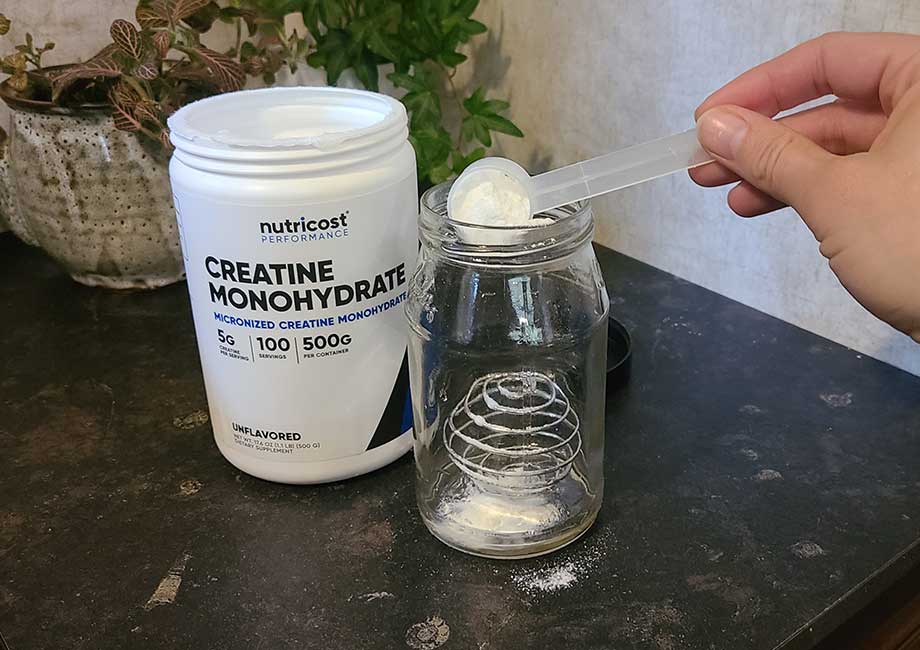
4. Produces More Muscle Growth
Muscle growth is probably the most common anecdotal use of creatine. And it works: a 9-year review of clinical trials14 found that creatine supplementation has a positive effect on muscle mass in “all healthy young populations, even in those who were untrained” but stresses that the most profound effects occur in conjunction with resistance training.
Additionally, a 2019 report in the Journal of Clinical Medicine15 found that creatine seems to be beneficial for older adults with sarcopenia, or age-related muscle loss.
5. Expedites Recovery After Workouts
Creatine may enhance post-workout muscle recovery by reducing the overall volume of muscle damage that occurs during exercise, as well as reducing the post-exercise inflammatory response, according to a 2021 literature review in the journal Nutrients16.
6. Might Reduce Incidence of Dehydration and Cramping
One common claim about creatine is that it can cause dehydration and cramping. This could have been hypothesized because creatine alters the water balance in your muscle cells. However, research shows that the opposite is true despite the altered water retention.
For example, one study17 followed college athletes for three years and found that those who supplemented with creatine were less likely to experience muscle cramps and dehydration. Another study18 looked at cyclists who performed a 30-minute cycling session followed by three 10-second sprints in a hot and humid environment. Compared to the placebo group, the cyclists who took creatine did not experience more cramping or dehydration. In fact, the creatine group performed better.
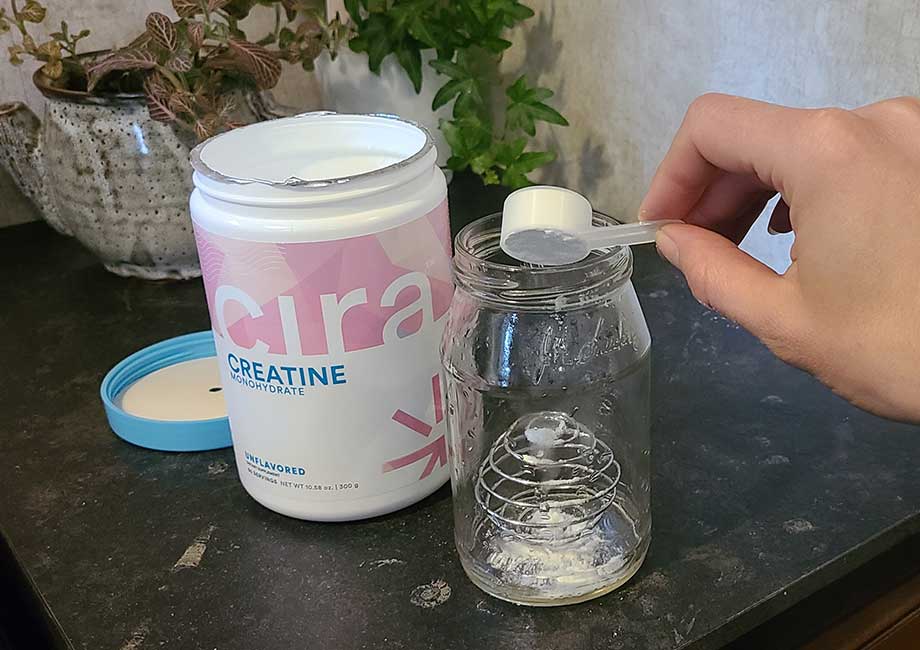
7. May Help Keep Blood Sugar Stable
Creatine affects the way a glucose transporter (GLUT-4) in your body works. It’s thought that creatine supplementation can increase the amount of GLUT-419, which removes glucose (sugar) from your blood and diverts it into your muscle cells.
In a 2007 randomized controlled trial published in the journal Amino Acids20, people who had diabetes and supplemented with creatine exhibited improved blood glucose control compared to people who had diabetes and did not take creatine. It’s important to know that aerobic exercise was a factor in this trial; so it can’t be said that creatine supplementation alone improves blood sugar control. More research is needed.
8. May Be Neuroprotective
In addition to its many benefits on performance, creatine may also have neurological benefits. It has been shown to assist in the treatment of muscular dystrophy 21, Parkinson’s disease 22, and Huntington’s disease 23. It’s important to note, though, that much of the research on creatine and its neuroprotective benefits has been conducted on animals, not humans, and many more, long-term human studies are needed to determine these relationships.
9. Improves Brain Function
If you’re looking to keep your brain health in tip-top shape, you may be in luck if you’re taking creatine supplements. Creatine plays a role in brain health and energy homeostasis, and taking oral creatine has been shown to increase measures of cognitive function, including intelligence test scores24 and memory25. However, research findings are very mixed, and it seems that these effects are more pronounced when the brain is in a challenged state, such as during sleep deprivation, according to a 2022 narrative review in the journal Nutrients26.
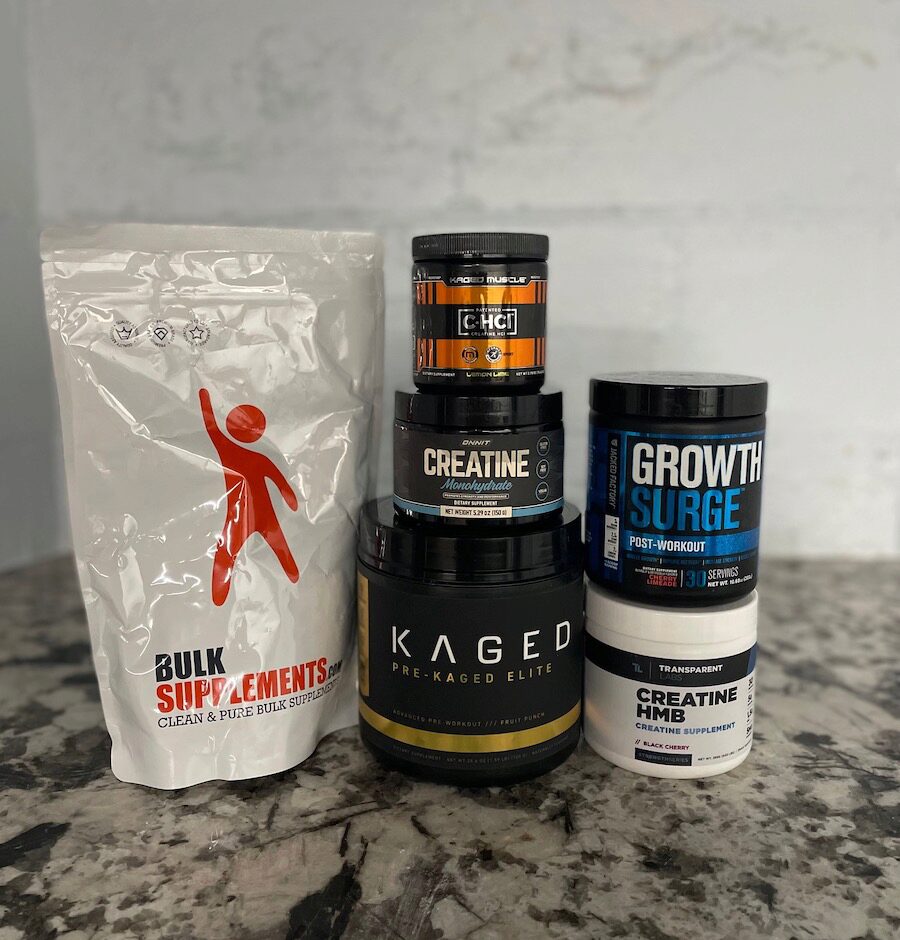
10. Fights Fatigue
Creatine may reduce general fatigue associated with sleep deprivation, as well as fatigue during exercise. There isn’t a ton of research on the relationship between creatine and fatigue prevention, but a few studies have shown that creatine can reduce mental fatigue, according to a 2021 systematic review in Nutrients27.
In a 2008 study in the Journal of the International Society of Sports Nutrition28, cyclists who consumed oral creatine had lower ratings of perceived fatigue than those who did not take creatine.
How To Supplement With Creatine
Creatine comes in powder, pill, and sometimes, gummy form. So, there are a few options for supplementing it.
Then, there’s the amount you should take. You can follow the recommendations on the product and take the daily maintenance dose of about 3 to 5 grams, or you can do a creatine loading phase and ramp up your usage over several weeks, ultimately taking about 20 to 25 grams of creatine split into equal doses throughout the day.
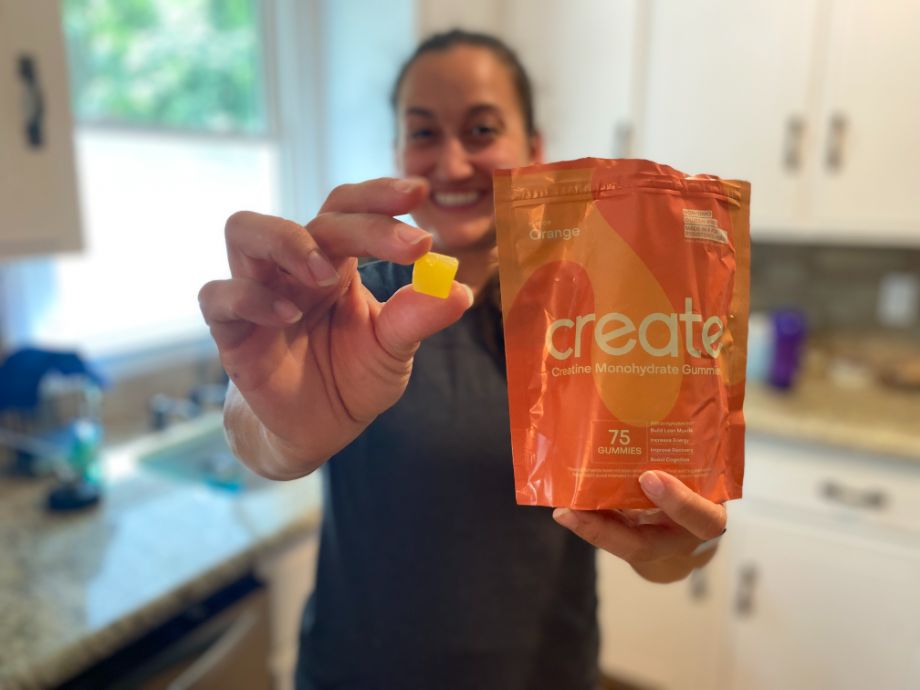
As for creatine timing, there’s mixed research on whether there’s an ideal time of day to take it. Most users will just have their creatine as part of their pre-workout regimen before a training session. Essentially, you can take creatine whenever it works for your schedule, and it won’t affect your results.
Common Myths and Misconceptions About Creatine
Let’s start by saying creatine is not a steroid. Some other common myths/misconceptions that you’ll see about creatine involve situations like weight gain, acne, hair loss, and dehydration.
In her article on creatine myths, Sports Dietitian Destini Moody, RD, CSSD, LD, dispels a lot of these. She concludes, “In reality, science over the years has shown that creatine is one of the safest supplements you can take, and there are no serious creatine side effects when taken as directed, except maybe a little GI distress when creatine loading if your body is not used to the compound. All in all, there are very few reasons to avoid taking creatine if you regularly engage in resistance training.”
Creatine Benefits: Final Thoughts
Creatine is the ideal supplement for people who want to:
- Increase muscle mass
- Increase muscle size
- Improve physical performance
It’s one of the only supplements that has an impressively conclusive clinically proven background, and it’s been proven safe for long-term use.
Creatine Benefits: FAQs
What are creatine side effects?
There are some adverse effects of creatine supplementation, but they are generally minor. Common complaints include bloating and water retention, abdominal cramping, and weight gain, the latter of which is often a combination of water weight and new muscle mass.
Some people are concerned about creatinine, a waste product of creatine. This byproduct is eliminated by the kidneys and excreted in urine, and it’s been hypothesized that creatine causes kidney damage due to elevated creatinine levels. However, research29 shows that this isn’t true and creatine has no negative effects on kidney function in healthy individuals (though people with kidney disease should always check with their doctor before starting to supplement with creatine). Even in people who supplemented30 with creatine for four years, no kidney damage was reported.
The International Society of Sports Nutrition’s position31 on creatine supplementation reports that no long-term adverse effects are associated with creatine supplementation.
Does creatine help with weight loss?
No, creatine is not a weight-loss supplement, although it may help you “recomp” your body weight. Body recomposition involves reducing body fat and increasing lean body mass. Exercise, including cardio and resistance training, a healthy diet, and plenty of quality sleep go a long way for body recomposition, and you don’t need supplements to do it.
Can I get enough creatine from food?
According to the National Academy of Sports Medicine2, creatine is found in the highest amounts in red meat and fish. This means vegetarians and vegans are likely to have lower levels of muscle creatine. If you eat enough animal products every day, you might be able to naturally replenish your creatine stores (remember, your body requires 1 to 3 grams of unsupplemented replenishment per day). However, to increase your muscle stores of creatine, you’ll benefit from the dietary supplement.
When to take creatine?
How much creatine should I take?
To complete a creatine loading phase, you should take 20 to 25 grams of creatine per day for five to seven days, split up into equal doses and taken throughout the day. For creatine maintenance, the recommended dose32 is 3 to 5 grams per day. You don’t need to do a loading phase to build muscle or reap the other benefits, but it will saturate your muscles much faster (in about a week compared to in about a month).
Is creatine OK to take everyday?
There are no known side effects of taking creatine every day as long as you stick to the recommended dose.
What form of creatine is best?
There are two forms of creatine you’ll see in supplements: creatine monohydrate and creatine hydrochloride (HCl). Creatine monohydrate is the “legacy” form of creatine and it’s the supplement that has been so heavily studied. Creatine HCl is newer and the addition of hydrochloric acid makes creatine more bioavailable and water-soluble. However, studies show that there is no notable benefit to taking HCl over monohydrate.
You may have also seen the term “creatine phosphate.” This isn’t usually sold as a supplement, rather, it’s the storage form of creatine in your body. Creatine phosphate “donates” its phosphate to adenosine diphosphate during the phosphocreatine cycle to create ATP, the molecule that powers your muscle fibers to contract.
Current research35 reports that there is not enough scientific evidence on newer forms of creatine to determine if they are more effective than creatine monohydrate.
What are the benefits of creatine?
Some creatine benefits include increases in muscular strength, power, and endurance and elevated levels of energy and cognition. Many of these purported benefits are well-studied with evidence to support these claims.
What are the pros and cons of creatine?
Pros of creatine are that it’s one of the most studied nutritional supplements, so there is a ton of data to support its effectiveness for muscle size and strength and the potential to help reduce muscle loss as you age.
Cons are that it may lead to increased water weight/bloating or cause other issues of stomach upset and digestive distress.
These statements have not been evaluated by the Food and Drug Administration. This product is not intended to diagnose, treat, cure, or prevent any diseases.
References
- National Center for Biotechnology Information. PubChem Compound Summary for CID 586, Creatine. https://pubchem.ncbi.nlm.nih.gov/compound/Creatine. Accessed May 31, 2023.
- Certified Sports Nutrition Coach. National Academy of Sports Medicine (NASM).
- Dunn J, Grider MH. Physiology, Adenosine Triphosphate. [Updated 2023 Feb 13]. In: StatPearls [Internet]. Treasure Island (FL): StatPearls Publishing; 2023 Jan-. Available from: https://www.ncbi.nlm.nih.gov/books/NBK553175/
- Guimarães-Ferreira L. Role of the phosphocreatine system on energetic homeostasis in skeletal and cardiac muscles. Einstein (Sao Paulo). 2014;12(1):126-131. doi:10.1590/s1679-45082014rb2741
- Sahlin K. Muscle energetics during explosive activities and potential effects of nutrition and training. Sports Med. 2014;44 Suppl 2(Suppl 2):S167-S173. doi:10.1007/s40279-014-0256-9
- Wang CC, Fang CC, Lee YH, Yang MT, Chan KH. Effects of 4-Week Creatine Supplementation Combined with Complex Training on Muscle Damage and Sport Performance. Nutrients. 2018;10(11):1640. Published 2018 Nov 2. doi:10.3390/nu10111640
- Butts J, Jacobs B, Silvis M. Creatine Use in Sports. Sports Health. 2018;10(1):31-34. doi:10.1177/1941738117737248
- Bogdanis GC, Nevill ME, Aphamis G, et al. Effects of Oral Creatine Supplementation on Power Output during Repeated Treadmill Sprinting. Nutrients. 2022;14(6):1140. Published 2022 Mar 8. doi:10.3390/nu14061140
- Hoffman J, Ratamess N, Kang J, Mangine G, Faigenbaum A, Stout J. Effect of creatine and beta-alanine supplementation on performance and endocrine responses in strength/power athletes. Int J Sport Nutr Exerc Metab. 2006;16(4):430-446. doi:10.1123/ijsnem.16.4.430
- Izquierdo M, Ibañez J, González-Badillo JJ, Gorostiaga EM. Effects of creatine supplementation on muscle power, endurance, and sprint performance. Med Sci Sports Exerc. 2002;34(2):332-343. doi:10.1097/00005768-200202000-00023
- Engelhardt M, Neumann G, Berbalk A, Reuter I. Creatine supplementation in endurance sports. Med Sci Sports Exerc. 1998;30(7):1123-1129. doi:10.1097/00005768-199807000-00016
- Bogdanis GC, Nevill ME, Aphamis G, et al. Effects of Oral Creatine Supplementation on Power Output during Repeated Treadmill Sprinting. Nutrients. 2022;14(6):1140. Published 2022 Mar 8. doi:10.3390/nu14061140
- Mills S, Candow DG, Forbes SC, Neary JP, Ormsbee MJ, Antonio J. Effects of Creatine Supplementation during Resistance Training Sessions in Physically Active Young Adults. Nutrients. 2020;12(6):1880. Published 2020 Jun 24. doi:10.3390/nu12061880
- Wu SH, Chen KL, Hsu C, et al. Creatine Supplementation for Muscle Growth: A Scoping Review of Randomized Clinical Trials from 2012 to 2021. Nutrients. 2022;14(6):1255. Published 2022 Mar 16. doi:10.3390/nu14061255
- Candow DG, Forbes SC, Chilibeck PD, Cornish SM, Antonio J, Kreider RB. Effectiveness of Creatine Supplementation on Aging Muscle and Bone: Focus on Falls Prevention and Inflammation. J Clin Med. 2019;8(4):488. Published 2019 Apr 11. doi:10.3390/jcm8040488
- Wax B, Kerksick CM, Jagim AR, Mayo JJ, Lyons BC, Kreider RB. Creatine for Exercise and Sports Performance, with Recovery Considerations for Healthy Populations. Nutrients. 2021;13(6):1915. Published 2021 Jun 2. doi:10.3390/nu13061915
- Greenwood M, Kreider RB, Melton C, et al. Creatine supplementation during college football training does not increase the incidence of cramping or injury. Mol Cell Biochem. 2003;244(1-2):83-88.
- Volek JS, Mazzetti SA, Farquhar WB, Barnes BR, Gómez AL, Kraemer WJ. Physiological responses to short-term exercise in the heat after creatine loading. Med Sci Sports Exerc. 2001;33(7):1101-1108. doi:10.1097/00005768-200107000-00006
- Gualano B, Novaes RB, Artioli GG, et al. Effects of creatine supplementation on glucose tolerance and insulin sensitivity in sedentary healthy males undergoing aerobic training. Amino Acids. 2008;34(2):245-250. doi:10.1007/s00726-007-0508-1
- Gualano B, Novaes RB, Artioli GG, et al. Effects of creatine supplementation on glucose tolerance and insulin sensitivity in sedentary healthy males undergoing aerobic training. Amino Acids. 2008;34(2):245-250. doi:10.1007/s00726-007-0508-1
- Kley RA, Tarnopolsky MA, Vorgerd M. Creatine for treating muscle disorders. Cochrane Database Syst Rev. 2013;2013(6):CD004760. Published 2013 Jun 5. doi:10.1002/14651858.CD004760.pub4
- Hass CJ, Collins MA, Juncos JL. Resistance training with creatine monohydrate improves upper-body strength in patients with Parkinson disease: a randomized trial. Neurorehabil Neural Repair. 2007;21(2):107-115. doi:10.1177/1545968306293449
- Kaemmerer WF, Rodrigues CM, Steer CJ, Low WC. Creatine-supplemented diet extends Purkinje cell survival in spinocerebellar ataxia type 1 transgenic mice but does not prevent the ataxic phenotype. Neuroscience. 2001;103(3):713-724. doi:10.1016/s0306-4522(01)00017-3
- Rae C, Digney AL, McEwan SR, Bates TC. Oral creatine monohydrate supplementation improves brain performance: a double-blind, placebo-controlled, cross-over trial. Proc Biol Sci. 2003;270(1529):2147-2150. doi:10.1098/rspb.2003.2492
- McMorris T, Mielcarz G, Harris RC, Swain JP, Howard A. Creatine supplementation and cognitive performance in elderly individuals. Neuropsychol Dev Cogn B Aging Neuropsychol Cogn. 2007;14(5):517-528. doi:10.1080/13825580600788100
- Forbes SC, Cordingley DM, Cornish SM, et al. Effects of Creatine Supplementation on Brain Function and Health. Nutrients. 2022;14(5):921. Published 2022 Feb 22. doi:10.3390/nu14050921
- Kreider RB, Stout JR. Creatine in Health and Disease. Nutrients. 2021;13(2):447. Published 2021 Jan 29. doi:10.3390/nu13020447
- Hadjicharalambous M, Kilduff LP, Pitsiladis YP. Brain serotonin and dopamine modulators, perceptual responses and endurance performance during exercise in the heat following creatine supplementation. J Int Soc Sports Nutr. 2008;5:14. Published 2008 Sep 30. doi:10.1186/1550-2783-5-14
- Antonio J, Candow DG, Forbes SC, et al. Common questions and misconceptions about creatine supplementation: what does the scientific evidence really show?. J Int Soc Sports Nutr. 2021;18(1):13. Published 2021 Feb 8. doi:10.1186/s12970-021-00412-w
- Schilling BK, Stone MH, Utter A, et al. Creatine supplementation and health variables: a retrospective study. Med Sci Sports Exerc. 2001;33(2):183-188. doi:10.1097/00005768-200102000-00002
- Kreider RB, Kalman DS, Antonio J, et al. International Society of Sports Nutrition position stand: safety and efficacy of creatine supplementation in exercise, sport, and medicine. J Int Soc Sports Nutr. 2017;14:18. Published 2017 Jun 13. doi:10.1186/s12970-017-0173-z
- Naderi A, de Oliveira EP, Ziegenfuss TN, Willems MT. Timing, Optimal Dose and Intake Duration of Dietary Supplements with Evidence-Based Use in Sports Nutrition. J Exerc Nutrition Biochem. 2016;20(4):1-12. doi:10.20463/jenb.2016.0031
- Ribeiro F, Longobardi I, Perim P, et al. Timing of Creatine Supplementation around Exercise: A Real Concern?. Nutrients. 2021;13(8):2844. Published 2021 Aug 19. doi:10.3390/nu13082844
- Antonio J, Ciccone V. The effects of pre versus post workout supplementation of creatine monohydrate on body composition and strength. J Int Soc Sports Nutr. 2013;10:36. Published 2013 Aug 6. doi:10.1186/1550-2783-10-36
- Fazio C, Elder CL, Harris MM. Efficacy of Alternative Forms of Creatine Supplementation on Improving Performance and Body Composition in Healthy Subjects: A Systematic Review. J Strength Cond Res. 2022;36(9):2663-2670. doi:10.1519/JSC.0000000000003873


